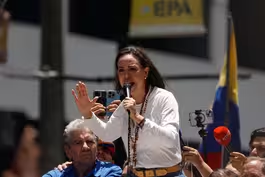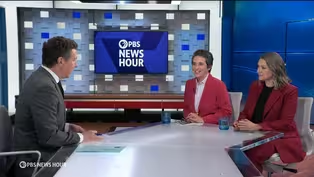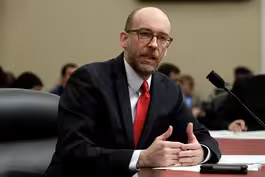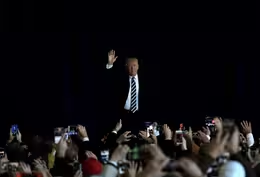
What Trump's appointments tell us about his economic agenda
Clip: 11/25/2024 | 6m 16sVideo has Closed Captions
What Trump's economic appointments tell us about his 2nd-term agenda
President-elect Trump continues to round out his Cabinet, including some key economic appointments. He's chosen billionaire hedge fund manager Scott Bessent for treasury secretary and for commerce, he's chosen Howard Lutnick, the CEO of Cantor Fitzgerald and a big backer of tariffs. William Brangham discussed what these choices mean for Trump's agenda with David Wessel.
Problems playing video? | Closed Captioning Feedback
Problems playing video? | Closed Captioning Feedback
Major corporate funding for the PBS News Hour is provided by BDO, BNSF, Consumer Cellular, American Cruise Lines, and Raymond James. Funding for the PBS NewsHour Weekend is provided by...

What Trump's appointments tell us about his economic agenda
Clip: 11/25/2024 | 6m 16sVideo has Closed Captions
President-elect Trump continues to round out his Cabinet, including some key economic appointments. He's chosen billionaire hedge fund manager Scott Bessent for treasury secretary and for commerce, he's chosen Howard Lutnick, the CEO of Cantor Fitzgerald and a big backer of tariffs. William Brangham discussed what these choices mean for Trump's agenda with David Wessel.
Problems playing video? | Closed Captioning Feedback
How to Watch PBS News Hour
PBS News Hour is available to stream on pbs.org and the free PBS App, available on iPhone, Apple TV, Android TV, Android smartphones, Amazon Fire TV, Amazon Fire Tablet, Roku, Samsung Smart TV, and Vizio.
Providing Support for PBS.org
Learn Moreabout PBS online sponsorshipWILLIAM BRANGHAM: Welcome to the "News Hour."
The two federal felony criminal cases against president-elect Donald Trump are being dropped.
Special counsel Jack Smith filed motions today to end the case, charging Trump with illegally holding classified documents and the other for his efforts to unlawfully overturn the 2020 presidential election.
Smith defended the evidence in both cases and the decision to prosecute, but said today's expected move hinged on a longstanding Justice Department policy that a sitting president cannot face criminal prosecution.
Smith left open the possibility the cases could be reopened when Trump leaves office.
Trump lauded today's move, writing, the cases were -- quote -- "empty and lawless."
Meanwhile the president-elect continues to round out his Cabinet, including some key economic appointments.
He's chosen billionaire hedge fund manager Scott Bessent for Treasury secretary.
And, for Commerce, he's chosen Howard Lutnick, the CEO of financial services firm Cantor Fitzgerald and a big backer of tariffs.
For more on what these choices mean for Trump's agenda, we are joined again by David Wessel.
He's the director of the Hutchins Center on Fiscal and Monetary Policy at the Brookings Institution.
David, so nice to see you again.
DAVID WESSEL, Brookings Institution: Good to be with you, William.
WILLIAM BRANGHAM: Let's talk a little bit -- a bit more about Scott Bessent.
The markets and investors seem to be very excited about his pick.
Why is that?
DAVID WESSEL: Yes, you could actually hear the sigh of relief from the markets that the president chose somebody like Scott Bessent, a hedge fund manager who actually could easily have been a Treasury secretary in a more conventional Republican administration, somebody who seems to be a calm set of hands in a very, very fiery Cabinet, if you don't mind the metaphor.
WILLIAM BRANGHAM: No, no, your metaphors always work for us.
(LAUGHTER) WILLIAM BRANGHAM: What is it about him then?
If he could fit into a Bush administration or a would-be Romney kind of administration, what is it that he brings that Trump seems to like?
DAVID WESSEL: Well, I think Donald Trump understands that he needs to have the financial markets on his side.
He may not care about the models that we have at the Brookings Institution, but he cares about the stock and bond markets.
And Scott Bessent has -- he seems to have a pretty clear message.
He's got this 333 plan, 3 percent growth, which is a little faster than we have had, but certainly could happen, 3 percent of GDP budget deficit, which would be heroic, half the current level of the deficit, and a three million increase in the barrel - - number of barrels of oil that we produce.
So he's got kind of a shtick, and I think people feel comfortable with him.
But I wonder whether he will actually have as much influence with the president as the markets seem to be hoping.
WILLIAM BRANGHAM: The contrast to that would be Howard Lutnick at Commerce, who seems to be a little bit on the opposite side of things than his Treasury pick.
DAVID WESSEL: Right.
Right.
So Howard Lutnick is a really interesting guy.
His firm almost got wiped out in 9/11.
He's very volatile.
He's very outspoken.
He would have been a pick that I think would have made people nervous.
And, as you point out, he's a big proponent of tariffs.
Scott Bessent is -- he's starting to mouth that tariffs are OK, but he talks about them as a negotiating tool, a lever.
We're not going to do anything radical, in a hurry and stuff like that.
So I begin to think it's a bit of a team of rivals.
The Wall Street Journal explained or described... WILLIAM BRANGHAM: This is like Lincoln's famous, sort of fractious Cabinet... DAVID WESSEL: Exactly.
WILLIAM BRANGHAM: ... that served to be a strength to have opposing viewpoints going at it.
DAVID WESSEL: Exactly.
The Wall Street Journal explained the competition between Scott Bessent Howard Lutnick to be Treasury secretary as a knife fight.
So that's quite a way to start an administration with these two economic policymakers who clearly don't trust each other.
WILLIAM BRANGHAM: On that issue of tariffs, which is Trump's off-stated belief that he will -- argument that he will put tariffs on China and other nations if they don't conform to his economic policies, how likely is it that he will do that and where -- which of those men will come out on top in that argument?
DAVID WESSEL: Well, we don't really know.
I mean, the question is, who will he listen to?
And predicting that with Donald Trump is always hard.
But worrying about the trade deficit and proposing tariffs has been something that Donald Trump has said for much of his political career or even before he was a politician.
So I suspect they will do something on tariffs.
It would be embarrassing if they didn't.
But the question is, will he do some little move and then we will see what the other side does or will he do something dramatic?
One thing that's really important is, the president has a lot of authority on tariffs, things he can do without the consent of Congress.
So that means the only break on him will be Scott Bessent and the markets.
WILLIAM BRANGHAM: To this team of rivals, we also -- they're not in the Cabinet, but we have also got Elon Musk and Vivek Ramaswamy, who are coming in with the pledge to chop, chop, chop.
DAVID WESSEL: Right.
WILLIAM BRANGHAM: How do you see that playing out?
DAVID WESSEL: I think this is going to be incredibly good theater.
We will see what they actually do.
WILLIAM BRANGHAM: Theater -- good theater, but maybe not good economics?
DAVID WESSEL: Well, we -- certainly, we have a big budget deficit problem, but it's really hard to fix.
If you say we want to cut taxes, we don't want to touch Social Security or Medicare.
So that leaves a big chunk of the budget on the side.
I am sure that Elon Musk and Vivek Ramaswamy will propose some spending cuts.
What I'm not so sure about is that Congress will go along with them.
In the past, the history of these commissions is, people who have been outside government, so you could cut this, you could cut that, you could cut this, and then when it gets to the Appropriations Committee and Congress, it's sort of like, well, maybe not this.
WILLIAM BRANGHAM: They say, we know who's really the boss.
DAVID WESSEL: Right, exactly.
So I think it's going to be quite contentious.
And I think the issue that Scott Bessent has is, he's the chief bond salesman for the world's largest debtor.
So, if Congress and President Trump do things that explode the deficit beyond current projections, he's going to have a hard time managing that without seeing a big increase in interest rates, which, of course, will filter through the economy, raise mortgage rates, and could slow the economy down.
WILLIAM BRANGHAM: David Wessel, always great to have your counsel.
Thank you so much.
DAVID WESSEL: You're welcome.
Biden grants final pardons to turkeys at the White House
Video has Closed Captions
Clip: 11/25/2024 | 3m 30s | Biden grants final pardons to turkeys at the White House (3m 30s)
Climate deal reached but developing nations 'not satisfied'
Video has Closed Captions
Clip: 11/25/2024 | 6m 56s | Developing nations leave UN climate conference with deal but say 'we're not satisfied' (6m 56s)
Opposition leader says Maduro is weak and desperate
Video has Closed Captions
Clip: 11/25/2024 | 8m 18s | Venezuela’s opposition leader says Maduro is 'weak' and 'desperate' amid crackdown (8m 18s)
Tamara Keith and Amy Walter on dismissal of Trump's cases
Video has Closed Captions
Clip: 11/25/2024 | 8m 40s | Tamara Keith and Amy Walter on the dismissal of Trump's federal criminal cases (8m 40s)
Trump names Project 2025 architect to key White House role
Video has Closed Captions
Clip: 11/25/2024 | 4m 24s | Trump names Project 2025 architect Russell Vought to key White House role (4m 24s)
Trump’s success among men illustrates manosphere's influence
Video has Closed Captions
Clip: 11/25/2024 | 8m 41s | Trump’s success among young men illustrates influence of online 'manosphere' (8m 41s)
Providing Support for PBS.org
Learn Moreabout PBS online sponsorshipSupport for PBS provided by:
Major corporate funding for the PBS News Hour is provided by BDO, BNSF, Consumer Cellular, American Cruise Lines, and Raymond James. Funding for the PBS NewsHour Weekend is provided by...

















